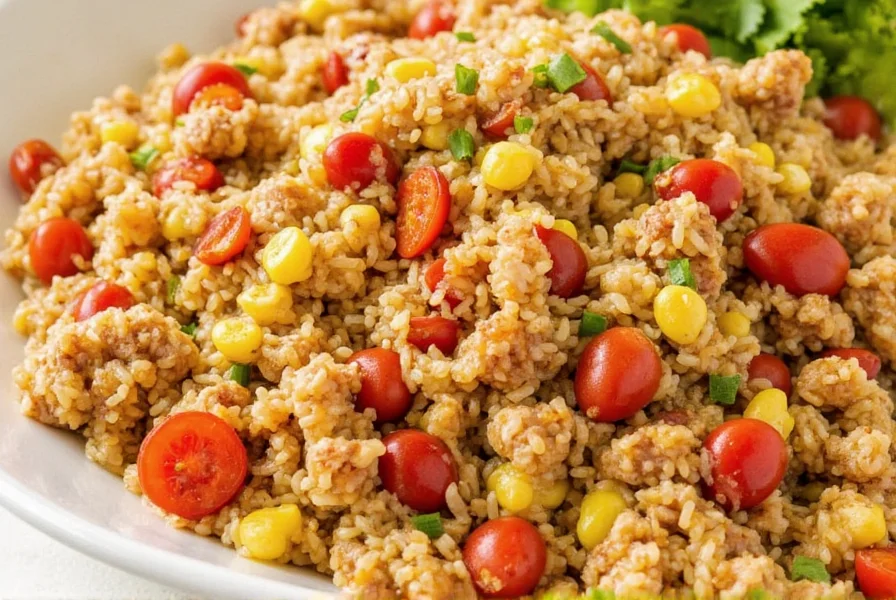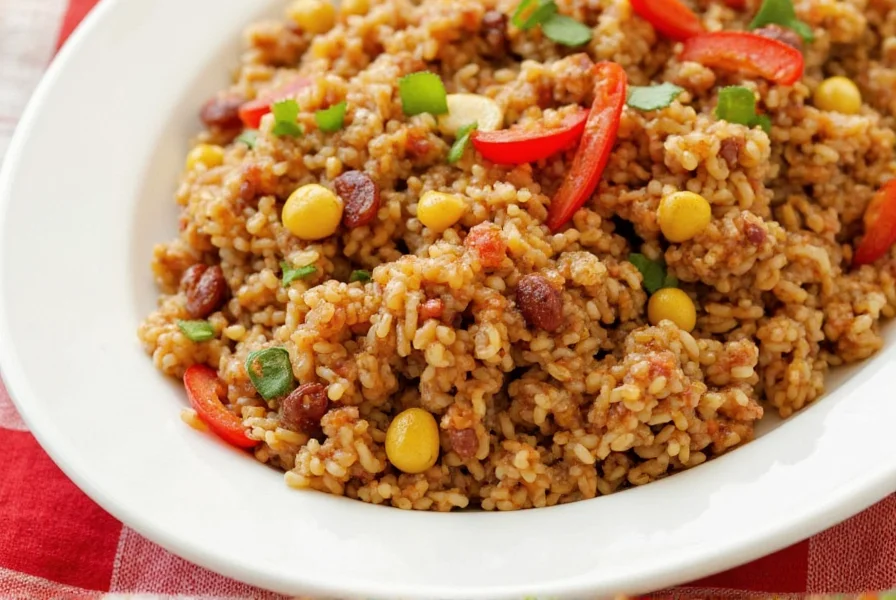Table of Contents
Homemade Jambalaya Seasoning Recipe
Authentic jambalaya starts with the right seasoning blend. This tested recipe delivers balanced heat, savory depth, and aromatic complexity in under 5 minutes. Perfect for seafood, chicken, or vegetable jambalaya.
| Ingredient | Amount | Function |
|---|---|---|
| Smoked Paprika | 2 tablespoons | Provides rich color and smoky base flavor |
| Cayenne Pepper | 1 tablespoon | Controls heat level (adjust to taste) |
| Garlic Powder | 1 tablespoon | Creates savory foundation |
| Onion Powder | 1 tablespoon | Enhances overall depth and sweetness |
| Dried Oregano | 1 teaspoon | Adds fresh herbal notes |
| Dried Thyme | 1 teaspoon | Brings subtle earthy complexity |
| Black Pepper | 1 teaspoon | Sharpens other flavors |
| Kosher Salt | 1 teaspoon | Essential for flavor balance |
Step-by-Step Instructions
- Combine all ingredients in a medium bowl
- Mix thoroughly using a whisk or spoon
- Transfer to an airtight container
- Store in a cool, dark place for up to 6 months
Pro Tip: For authentic Creole-style seasoning, reduce cayenne to 1/2 teaspoon and increase smoked paprika to 2.5 tablespoons. For Cajun-style, increase cayenne to 1.5 tablespoons and add 1/2 teaspoon of ground white pepper.
Pro Tips for Perfect Flavor
- Always measure by weight for consistency - 1 tablespoon of paprika weighs 8g while cayenne weighs 6g
- Toast whole spices before grinding for maximum aroma (especially for cumin or coriander variations)
- Test before using - sprinkle a pinch on cooked rice to check balance before adding to your jambalaya
- Adjust for protein type: Use 1.5 tablespoons per pound of seafood, 2 tablespoons per pound of chicken or sausage
Store-Bought vs Homemade Comparison
| Characteristic | Homemade Blend | Store-Bought Blend |
|---|---|---|
| Customization | Fully adjustable to personal taste | Fixed ratios with limited flexibility |
| Shelf Life | 6-12 months (when stored properly) | Typically 3-6 months |
| Cost per Batch | $0.25-$0.50 | $1.50-$3.00 per container |
| Sodium Content | Controlled (1 tsp salt per batch) | Often higher due to added salt |
| Ingredient Transparency | Full control over all components | May contain anti-caking agents or undisclosed fillers |
Frequently Asked Questions
How long does homemade jambalaya seasoning last?
When stored in an airtight container away from heat and light, homemade jambalaya seasoning maintains peak flavor for 6-12 months. For optimal freshness, label containers with preparation date and use within 6 months. While not spoiled after this period, spices gradually lose potency and vibrancy.
Can I make jambalaya seasoning without cayenne pepper?
Absolutely. For mild heat, replace cayenne with 1 tablespoon of sweet paprika. For moderate heat without cayenne, use 1 teaspoon of crushed red pepper flakes. Traditional Creole versions often omit cayenne entirely, relying on paprika and black pepper for depth.
What's the difference between Cajun and Creole seasoning?
Cajun seasoning typically features higher cayenne levels (1.5-2 tablespoons per batch) with emphasis on garlic and onion powders, creating a bolder, earthier profile. Creole seasoning emphasizes herbs (oregano, thyme) and smoked paprika for a more nuanced, slightly sweeter flavor. Our recipe balances both traditions for versatile use.
How much seasoning should I use per pound of meat?
For best results: 1.5-2 tablespoons per pound of meat. Start with 3 tablespoons for a standard jambalaya (1.5 lbs meat + 1.5 cups rice). Always taste during cooking and adjust - seafood requires less seasoning than sausage or chicken.
Can I use fresh herbs instead of dried in the seasoning blend?
Fresh herbs aren't suitable for dry seasoning blends due to moisture content causing clumping and spoilage. However, add 1-2 tablespoons of fresh thyme and oregano during the last 10 minutes of cooking for brighter herbal notes that complement the dry blend.












 浙公网安备
33010002000092号
浙公网安备
33010002000092号 浙B2-20120091-4
浙B2-20120091-4